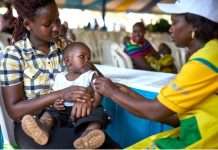In this exclusive chat with Pharmanews, President of the National Association of Nigeria Traditional Medicine Practitioners (NANTMP), His Royal Highness Chief (Prof.) T.O. Omon Oleabhiele highlights the importance of clinical record keeping in traditional medicine, urging every practitioner to strictly adhere to the rules. He also pinpoints the various misconceptions about alternative medicine practice, while calling on the government to assist herbal practitioners financially. Excerpts:
How would you assess the performance of herbal practitioners in the last two years?
It is in two folds, if you mean assessment in the production of traditional medicines, they are actually trying; however I will reprove them for their unscrupulous behaviour in displaying fake certificates, which they use for dubious purposes. Nonetheless, we are working on curbing this malpractice in the profession.
One major challenge of alternative medicine practice is lack of proper documentation. Is there any plan by NANTMP to correct this?
Presently, we have devised our own means of record-keeping in the profession, which the government is ready to collaborate with us on; but it appears medical doctors are not prepared to acknowledge the documented lists of patients certified cured with herbal treatment, which we have as our evidence. We have the list of patients who were so bad at the time they came to us, but they are now very well, to the point that one can hardly believe they were once ill. There are physical results that are verifiable, because the patients are well, and they have started bearing children, building houses, and so on.
Every traditional doctor does not only document his formulas, but he documents patients’ medical history, places visited, stages of illness, and recovery time. All this information is now documented in trado-medical homes. So, documentation is really vital, and every traditional doctor must ensure he keeps patients’ bio-data and medical history.
There is widespread assumption that traditional medicines lack peer review and scientific scrutiny, which make them untested for safety and efficacy. How true is this?
That is a wrong assumption because most traditional medicines, as at today, are registered by NAFDAC, and NAFDAC registration shows that the toxicological aspects of the medicines are valued, viewed, scrutinised, and certified safe for consumption. In fact, NAFDAC has a pharmacovigilance section which monitors drug adverse effects on patients, and also confiscates those drugs capable of affecting patients negatively. In order to control the circulation of such drugs, the pharmacovigilance department checks them batch by batch, to detect the harmful drugs and curtail their spread. Traditional medicine is standardised now.
The practice whereby alternative medicine practitioners refuse to reveal active ingredients in their products for the fear of losing their patent right is on the increase. How can this challenge be best resolved?
The issue is that what their grandfathers passed down to them is their source of information. However, the situation is changing gradually, as the leadership of NANTMP is leading by example for others to emulate and change their unethical practices. For instance, someone called me from Akure in Ondo State recently, and said he was surfing the web on remedies for an infection in his body. He said he discovered I could cure the case with a plant called cassia prodocappa. If I didn’t reveal the content of the medicine, it would be difficult for the patient to know cassia prodocappa. To this end, I will say that we normally reveal our active principles – though not all practitioners are practising on a level ground. However, since my humble self as the president of NANTMP has started the campaign, others have no choice than to do same.
On dosage, from time immemorial, dosage has always been available for various herbal medicines, but break in communication creates confusion among patients. It is the practitioner who formulates a compound that can actually give the right dosage for the compound. Dosage of traditional medicines is either half a teaspoon, a teaspoon, a shot or half a shot, and it could be powder or liquid.
In what ways can the government and research institutions assist traditional practitioners to make their products safety and efficacy compliant?
Government can give grants to herbal practitioners or instruct the bank of industry to create soft loans for manufacturers, with laid down criteria for beneficiaries to fulfil. This will go a long way in expanding our traditional herbal medicine industry. Such grant has never been in the past.
As the president of NANTMP, what is your vision for the practice in 2015?
Traditional medicine is gradually becoming the household medicine everybody is embracing because it is less hazardous, compared to artificially synthesised drugs. Intellectuals, especially, are shifting to traditional medicines, particularly those that are NAFDAC certified and are decently packaged.
Years back, the elite rejected herbal medicines due to unprofessional packaging. Now that the industry is advancing in knowledge, with fascinating packs for local drugs, majority of the elite now prefer alternative medicines to conventional drugs. With this development, I can confidently say that traditional medicines will dominate the market in 2015, with revolutionised packaging.













Natural Herbal Medicine Is Best,To Cure Differents,Diseases.(I am TMP)AKINKUNMI.
I just want to know if there is a proven herbal remedy against the skin disease called psoriasis and how I can access it.I have been suffering from it for 20 years and have used all sorts of pharmaceutical preparations to no avail. Thank you.